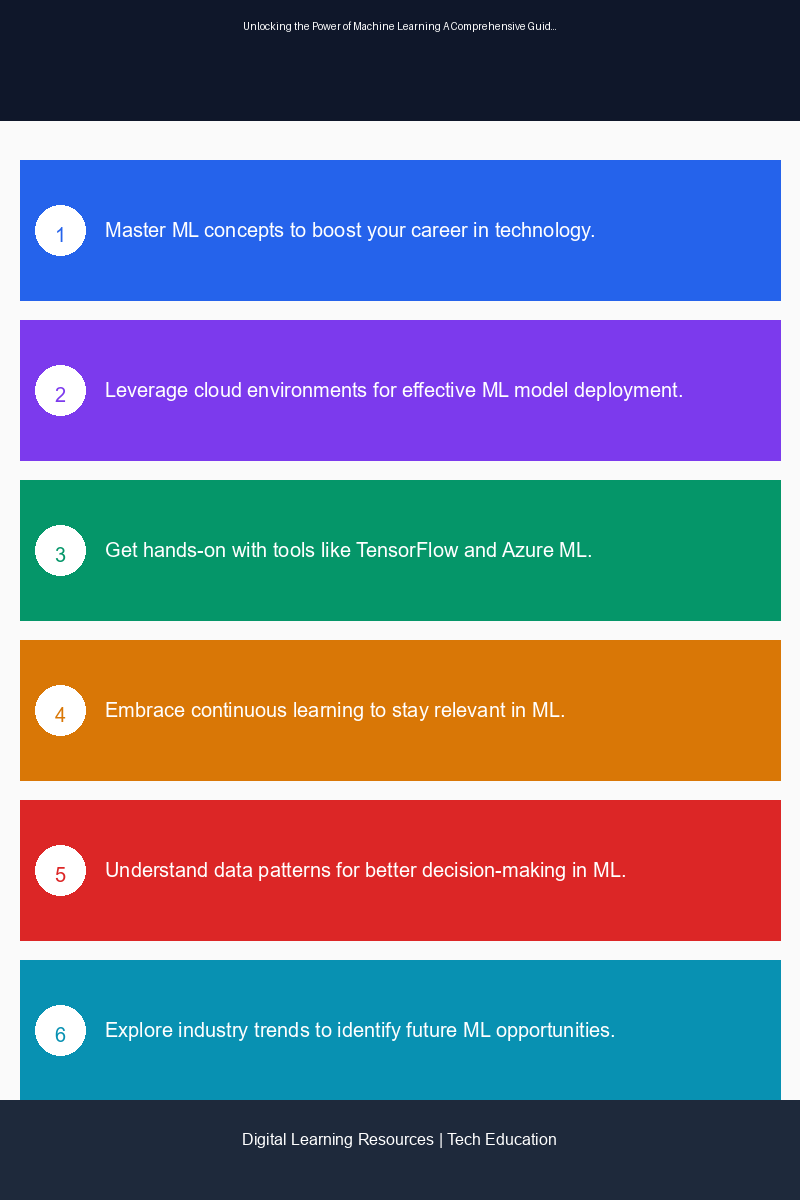As technology continues to evolve, the demand for machine learning (ML) expertise is skyrocketing. This blog post serves as a comprehensive resource for developers, IT professionals, and tech learners looking to deepen their understanding of ML concepts, tools, and career opportunities. Here, we explore essential technical concepts, practical applications, learning pathways, and industry trends. By the end of this post, you’ll be equipped with actionable insights to navigate the ML landscape effectively.
Key Takeaways
- Machine learning empowers systems to learn from data without explicit programming.
- Understanding cloud-based environments is crucial for ML model development and deployment.
- Familiarity with popular ML tools like TensorFlow, Azure ML, and IBM Watson can enhance your career prospects.
- Continuous learning and skill enhancement are vital in this rapidly evolving field.
Technical Background and Context
Machine learning is a subset of artificial intelligence (AI) that focuses on enabling systems to learn from data and improve their performance over time. Rather than relying on explicit programming to perform tasks, ML systems leverage algorithms to identify patterns and make decisions based on experience. This self-learning process is initiated through data analysis, observations, or experiences, ultimately leading to better decision-making.
The exponential growth in ML tools and frameworks has made it easier than ever for developers to build and deploy models. Companies are increasingly relying on AI and ML to automate business activities, enhance decision-making processes, and create more personalized customer experiences.
📚 Recommended Digital Learning Resources
Take your skills to the next level with these curated digital products:
AI Enhanced Resume Builder
AI Resume Builder Flask App – Complete Source Code + PDF Tutorial + HTML | Digital Download for Designers
Learn AWS: Your First Cloud Application
Learn AWS: Your First Cloud Application
📊 Key Learning Points Infographic

Visual summary of key concepts and actionable insights
Comprehensive SAT Prep: 470+ Vocabulary Words
Comprehensive SAT Prep: 470+ Vocabulary Words
Master DevOps in Practice – 50 Essential Topics for Engineers (PDF eBook)
Master DevOps in Practice – 50 Essential Topics for Engineers (PDF eBook)
The Ultimate Keyboard Shortcut Guide 49 Software Cheat Sheets in One PDF Bundle
The Ultimate Keyboard Shortcut Guide 49 Software Cheat Sheets in One PDF Bundle
Practical Applications and Use Cases
Machine learning has a wide range of practical applications across various industries. Here are some notable use cases:
- Healthcare: ML algorithms can analyze patient data to predict disease outbreaks, personalize treatment plans, and improve diagnostic accuracy.
- Finance: Financial institutions use ML for fraud detection, credit scoring, and algorithmic trading to optimize investment strategies.
- Retail: E-commerce platforms employ ML for personalized product recommendations, inventory management, and customer sentiment analysis.
- Manufacturing: Predictive maintenance powered by ML can minimize downtime and optimize operational efficiency.
These examples illustrate how ML is reshaping industries and creating new opportunities for tech professionals to innovate and excel.
Learning Path Recommendations
To effectively harness the power of machine learning, aspiring professionals should consider the following learning paths:
- Fundamentals of Machine Learning: Start with the basics of ML concepts, algorithms, and data preprocessing techniques.
- Cloud-Based ML Deployment: Gain expertise in deploying ML models using platforms like Microsoft Azure Machine Learning, IBM Watson, and Amazon Machine Learning.
- Hands-On with Frameworks: Learn to use popular ML libraries such as TensorFlow and Breeze for model development and analysis.
- Advanced Topics: Dive into deep learning, natural language processing (NLP), and reinforcement learning for specialized knowledge.
Consider enrolling in online courses or obtaining certifications in these areas to validate your skills and enhance your employability.
Industry Impact and Career Implications
The rise of machine learning has significant implications for career development in the tech industry. As businesses increasingly adopt AI and ML technologies, professionals with relevant skills are in high demand. Some key career roles include:
- Machine Learning Engineer: Focuses on designing, building, and deploying ML models.
- Data Scientist: Analyzes and interprets complex data to inform business decisions.
- AI Research Scientist: Conducts research to advance the field of AI and ML.
- Business Intelligence Analyst: Uses ML insights to drive strategic business decisions.
Having skills in data processing, model development, and familiarity with cloud environments can set you apart from the competition and position you for success in these roles.
Implementation Tips and Best Practices
When working with machine learning, consider the following best practices to enhance your projects:
- Start with Clean Data: Ensure your data is accurate, complete, and well-structured before feeding it into ML models.
- Choose the Right Model: Select a model that best suits your specific problem and data characteristics. Experiment with various algorithms to find the best fit.
- Monitor Performance: Regularly evaluate your model’s performance using metrics such as accuracy, precision, and recall to ensure it meets the desired outcomes.
- Iterate and Improve: Machine learning is an iterative process. Continuously refine your models based on new data and insights.
Following these best practices can lead to more effective and reliable machine learning solutions.
Future Trends and Skill Requirements
The future of machine learning is bright, with several trends shaping the landscape:
- Increased Automation: Businesses will continue to adopt ML for automating routine tasks, leading to improved efficiency and productivity.
- Integration with IoT: The convergence of ML and the Internet of Things (IoT) will enable smarter devices and systems that learn and adapt in real-time.
- Ethical AI: As ML becomes more prevalent, the focus on ethical considerations and responsible AI practices will intensify.
- Upskilling and Reskilling: Continuous learning will remain essential as technologies evolve and new tools emerge.
To stay competitive, professionals should prioritize honing their skills in emerging ML technologies and methodologies.
Conclusion with Actionable Next Steps
Machine learning offers a wealth of opportunities for tech professionals ready to embrace its potential. To capitalize on this growing field, consider taking the following actionable steps:
- Enroll in online courses or certification programs focusing on machine learning and AI.
- Gain hands-on experience by working on real-world projects or contributing to open-source initiatives.
- Join online communities, forums, and meetups to network with other professionals and stay updated on industry trends.
- Keep learning and experimenting with new tools and frameworks to refine your skills and expand your knowledge base.
By committing to continuous learning and skill enhancement, you can position yourself as a valuable asset in the machine learning landscape and advance your career in this exciting field.
Disclaimer: The information in this article has been gathered from various reputed sources in the public domain. While we strive for accuracy, readers are advised to verify information independently and consult with professionals for specific technical implementations.
Ready to advance your tech career? Explore our digital learning resources including programming guides, certification prep materials, and productivity tools designed by industry experts.



